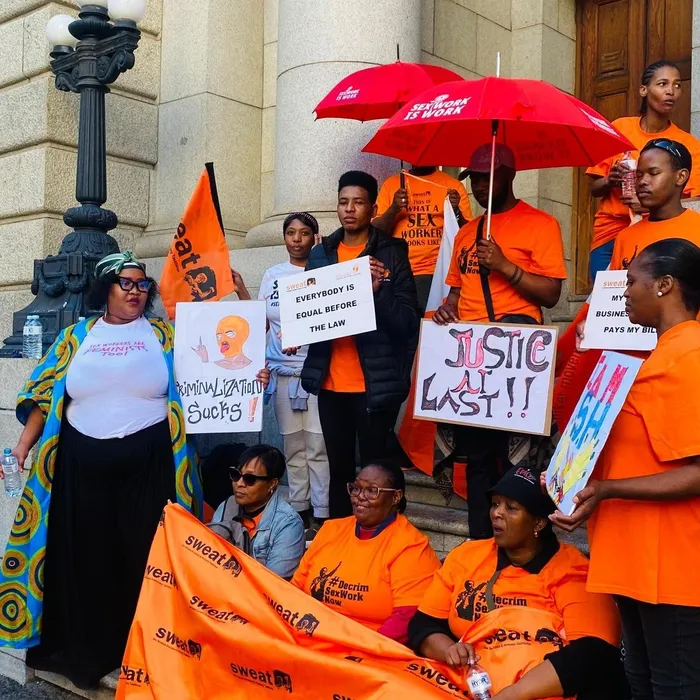
In a landmark case, various organisations are pushing for the decriminalisation of sex work in South Africa, arguing that current laws violate the rights of sex workers.
Image: Asijiki Coalition / Facebook
A number of organisations are gearing up as they advocate for the decriminalisation of sex work in South Africa which will highlight the human rights violations suffered by sex workers under, what they describe as, an “outdated criminal legal framework”.
This week in the Western Cape High Court SECTION27, representing the Treatment Action Campaign (TAC), and Sonke Gender Justice (Sonke) along with the African Policing Civilian Oversight Forum (APCOF), the Centre for Human Rights, University of Pretoria (CHR), and the Dullah Omar Institute (DOI) represented by Lawyers for Human Rights and the Women’s Legal Centre were of the organisations admitted as amici.
The main application, brought by S.H and Sex Workers Education and Advocacy Taskforce (SWEAT), against the Minister of Justice and Correctional Services and others seeks to decriminalise sex work in South Africa.
The applicants challenge the constitutionality of provisions under the Sexual Offences Act 23 of 1957, the Criminal Law (Sexual Offences and Related Matters) Amendment Act 32 of 2007 (SORMA), and the City of Cape Town By-Law on Streets, Public Places, and the Prevention of Noise Nuisances (the By-Laws), insofar as they criminalise the provision and solicitation of sex work.
On Monday and Tuesday each of the organisations made oral submissions in their bid for admission. The main hearing will be on 18 to 20 May 2026 at the Western Cape High Court Division, Cape Town.
“The evidence presented by TAC and Sonke shows that sex workers are frequently denied access to essential health services and that their interactions with the public health system are shaped by stigma, criminalisation, and fear of police surveillance.
"The criminalisation of sex work thus significantly impedes the realisation of sex workers’ right to health, leading to poorer health outcomes and violating their fundamental human rights,” said SECTION27.
TAC and Sonke further argued that the criminalisation fosters an environment of greater vulnerability to violence, often perpetrated by those in positions of authority. The organisations will present evidence of sex workers’ lack of trust in the police and evidence of sexual violence and rape perpetrated by the police.
Enquiries to the ministry of Justice and Constitutional Development were acknowledged but had not been answered by deadline.
“Since sex work is illegal, sex workers are reluctant to report assaults for fear of being charged with sex work-related offences,” said SECTION27.
Sonke said: “The decriminalisation of sex work – the removal of the criminal law and the implementation of a rights-based approach to aspects of sex work – will not only make sex work and sex workers safer, but will also reduce levels of GBV and have a far-reaching impact on public health.”
Celebrating the admission as amici, the Women’s Legal Centre (WLC) said they will provide the court with a “legal analysis rooted in substantive equality and transformative justice".
“We believe that the full decriminalisation of sex work is critical to ending systemic discrimination and ensuring sex worker rights are recognised and protected,” WLC said.
The University of Pretoria (UP) Centre for Human Rights said: “The Amici applicants intend to assist the Court in determining appropriate remedies that are consistent with South Africa’s constitutional and regional human rights obligations.
"Their submissions aim to support the development of law enforcement and policy frameworks that ultimately protect the rights, dignity, and safety of sex workers, while promoting equality, access to justice, and social protection. Thus, the hearing marks a significant moment for the advancement of human rights.”
According to the Asijiki Coalition for the Decriminalisation of Sex Work (Asijiki) - a group of sex workers, activists, advocates and human rights defenders who advocate for law reform - the decriminalisation of sex work would allow sex workers to function within a human rights framework, as it would entail the following:
chevon.booysen@inl.co.za
Related Topics: